

An Argument Why Journalists Should Not Abandon Objectivity. In “Losing the News: The Future of the News that Feeds Democracy,” published by Oxford University Press, Alex S.
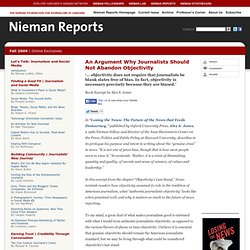
Jones, a 1982 Nieman Fellow and director of the Joan Shorenstein Center on the Press, Politics and Public Policy at Harvard University, describes in its prologue his purpose and intent in writing about the “genuine crisis” in news. Objectivity v Transparency - does journalism need a new ideology? What is the hallmark of good journalism?
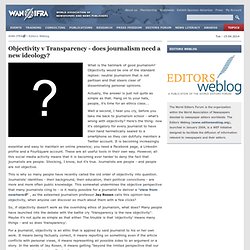
Objectivity would be one of the standard replies: neutral journalism that is not partisan and that steers clear of disseminating personal opinions. Actually, the answer is just not quite as simple as that. Hang on to your hats, people, it's time for an ethics class... Objectivity and Fairness - Objectivity and fairness in news stories. You hear it all the time – reporters should be objective and fair.
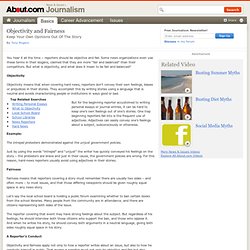
Some news organizations even use these terms in their slogans, claimed that they are more “fair and balanced” than their competitors. But what is objectivity, and what does it mean to be fair and balanced? Objectivity Objectivity means that when covering hard news, reporters don’t convey their own feelings, biases or prejudices in their stories. They accomplish this by writing stories using a language that is neutral and avoids characterizing people or institutions in ways good or bad. But for the beginning reporter accustomed to writing personal essays or journal entries, it can be hard to keep one’s own feelings out of one’s stories. UNT talk-Objectivity in Journalism. University of North Texas Nature Writing Symposium talk: “Changing the World One Story at a Time” April 2007 Copyright © 2007 Wendee Holtcamp – bohemian@wendeeholtcamp.com Suppose you are given a bucket of water.
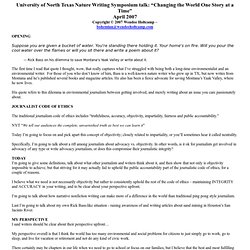
You're standing there holding it. -- Rick Bass on his dilemma to save Montana's Yaak Valley or write about it. The first time I read that quote I thought, wow, that really captures what I’ve struggled with being both a long-time environmentalist and an environmental writer. His quote refers to this dilemma in environmental journalism between getting involved, and merely writing about an issue you care passionately about. The traditional journalism code of ethics includes “truthfulness, accuracy, objectivity, impartiality, fairness and public accountability.” NYT “We tell our audiences the complete, unvarnished truth as best we can learn it” Specifically, I’m going to talk about a rift among journalists about advocacy vs. objectivity. “But now, says the Once-ler, Now that you´re here,
Principles of Journalism. The first three years of the Project’s work involved listening and talking with journalists and others around the country about what defines the work.

What emerged out of those conversations are the following nine core principles of journalism: 1. Journalism’s first obligation is to the truth Democracy depends on citizens having reliable, accurate facts put in a meaningful context. James O'Keefe Is Capitalizing on the Cult of Journalistic Objectivity - Conor Friedersdorf - Politics. His latest sting is yet more evidence that pretending reporters have no opinions or biases is no longer tenable Here's how Brooke Gladstone, host of the NPR show On the Media, summed up one obligation of professional journalists: "Checking your life at the door is -- at least for now -- a condition for working at traditional media news outlets.

When I interviewed Lianne Hanson as she retired from her host job, she said she was looking forward to being able to express herself freely and publicly in the world. " Is this a smart norm? It isn't, I argued in a recent post, and I want to return to it, because subsequent events have only reinforced the point. "It may seem like a good idea to avoid the 'perception of bias' by insisting that media employees hide who they are from the audience. Rethinking Journalism Ethics, Objectivity in the Age of Social Media.
In response to the rapidly changing media environment, many schools and academic programs are offering novel approaches to journalism education.
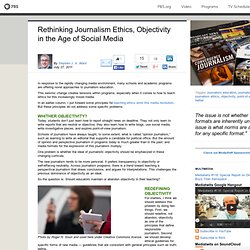
This seismic change creates tensions within programs, especially when it comes to how to teach ethics for this increasingly mixed media. In an earlier column, I put forward some principles for teaching ethics amid this media revolution. But these principles do not address some specific problems. Questioning Journalistic Objectivity. Journalism, as we've known it, has been mourned deeply over the last few years.
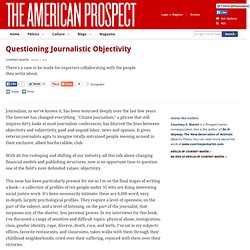
The Internet has changed everything. Public Journalism and the Problem of Objectivity. The Myth of Objectivity in Journalism. By This page has been accessed since 29 May 1996.
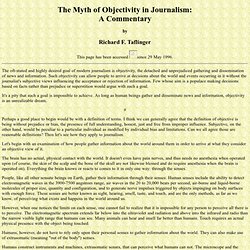
The oft-stated and highly desired goal of modern journalism is objectivity, the detached and unprejudiced gathering and dissemination of news and information. Such objectivity can allow people to arrive at decisions about the world and events occurring in it without the journalist's subjective views influencing the acceptance or rejection of information. Few whose aim is a populace making decisions based on facts rather than prejudice or superstition would argue with such a goal. It's a pity that such a goal is impossible to achieve. Perhaps a good place to begin would be with a definition of terms. Let's begin with an examination of how people gather information about the world around them in order to arrive at what they consider an objective view of it. The brain has no actual, physical contact with the world.
People, like all other sensate beings on Earth, gather their information through their senses. The answer is no. Objectivity in Journalism. DAVID BROOKS There is some dispute about whether objectivity can really exist.
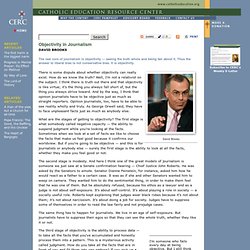
How do we know the truth? Well, I’m not a relativist on the subject. I think there is truth out there and that objectivity is like virtue; it's the thing you always fall short of, but the thing you always strive toward. And by the way, I think that opinion journalists have to be objective just as much as straight reporters. Opinion journalists, too, have to be able to see reality wholly and truly.